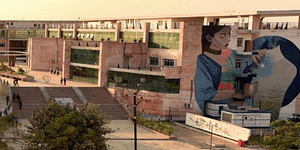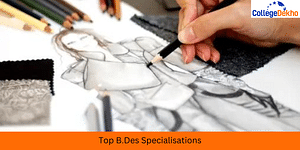Ceramic Design
About Ceramic Design
Ceramic art has been associated with distinguished artwork and human existence since ancient times. Over the years, the popularity of Ceramics Design has only evolved and expanded into various forms. In India, there are a limited number of courses in this field of design, with NID Ahmedabad being one of the most popular design institutes to offer Ceramic design courses at both undergraduate and postgraduate levels. The curriculum of any of the courses in Ceramic Design focuses on providing a thorough knowledge of colour, composition, ergonomics and understanding of the core materials. Ceramic and glass design often go hand-in-hand.
Ceramic Design is expected to never go out of style, which is primarily because ceramic objects or art can always find a place in at least one room in every house. One with a degree in ceramic design can either go for jobs at large associations like Natalie Weinberger Ceramics, Satyam Gartex, etc. or even choose to be self-employed.
What is Ceramic Design?
Ceramic Design is all about mixing earthen elements with soft clay, water and powder and then giving them different shapes and firing to develop ceramic. Ceramic art has existed since ancient times and has experienced many changes with time. Today, people consider it as a branch of study and educate themselves through its education to make a career in the ceramic design industry.
Ceramic Design-Type of Courses
There are a few Ceramic Design courses available in India. Check out the list below:
- Certificate full-time Ceramic Design
- Undergraduate Diploma in Ceramic Design
- BDes in Ceramic and Glass Design
- MDes in Ceramic and Glass Design
- MFA Ceramic Design
How to Be a Ceramic Designer?
If a student has creative skills and a passion for ceramic design, then he/she can become a ceramic designer in the future provided he meets the following conditions:
Students must ensure that they have earned good scores in their class 12th. It would be better if they have a science background and studied Physics and Chemistry. Learning these two basic sciences would help the learners to understand the materials and characteristics of their bachelor’s degree studies in Ceramic Design. Those who want to pursue a bachelor’s degree can enroll in the Bachelor’s of Ceramic and Glass Design courses which are offered by various institutes in India
After completing the BDes program in Ceramic and Glass Design, one can pursue higher studies in the same domain. For the Master’s degree program students can get admitted MDes in Ceramic Design which is a two-year-long program. To get admitted to MDes courses, students need to appear in the entrance test. And the final admission is offered based on their performance in the design. On the completion of any of the courses, students will earn a degree and certificate which will help them to begin their career as Ceramic Designer.
Why should Pursue Ceramic Design Course?
There are numerous reasons one should pursue a Ceramic Design course. A few of the reasons are mentioned below:
- The first and foremost reason is passion for Ceramic Design. One should pursue Ceramic Design if he/she possesses an intense interest in the subject and want to make a career in it. This course helps to become a trained ceramic artist in the future.
- This course comes with a holistic approach to learning and enables the students to learn about this art and craft in an in-depth manner.
- The Ceramic Design course teaches basic elements and basic methods of work. And thus, develops a strong foundation level knowledge for the learners.
- Hand building, mold casting, and wheel throwing are some of the important aspects one would gain knowledge through a Ceramic Design course
- The institutes offering Ceramic Design courses in India often include workshops and demonstrations to improve the learning culture. Through such methods of teaching, the learners achieve a clear vision of the ceramic design works.
- Through a Ceramic Design course, the students would be able to nurture their inherent skills in the proper way and guide themselves toward a successful career in the ceramic design industry.
Who should Pursue a Ceramic Design Course?
- Those who want to make a promising career in the field of ceramic design should pursue the course. As there are different levels of courses, one should choose them according to their needs and interest.
- The industry welcomes only people having creative instincts, artistic approaches and commercial awareness. So, people who have these qualities are suitable for any Ceramic Design course.
- Individuals who have basic knowledge of non-metallic and inorganic objects can pursue this course
Ceramic Design Course Objectives
There are plenty of course objectives with the Ceramic Design course. A few of them are mentioned below:
- To develop and enhance the aesthetic sense of the ceramic design
- To teach the design fundamentals like structure, colour, space etc.
- To impart learning of ergonomics in terms of usability awareness
- To help the students learn about different materials including metal, leather and other needed materials
- To enable the students to work in various design industries apart from ceramic design
Table of Contents
Ceramic Design Eligibility Criteria
The eligibility criteria mentioned below are only to give you an idea of the minimum eligibility requirements for the Ceramic Design courses available in India at undergraduate, postgraduate and diploma levels. This may vary from institute to institute which shall be referred to before applying to any college.
-
To be eligible for a UG course in Ceramic Design, candidates must have passed 10+2 from a recognised Board of education. The candidate must have scored not less than 50%-60% in the qualifying examination.
-
To be eligible for a PG course in Ceramic Design, candidates must have passed graduation in a relevant field from a recognised university. The candidate must have scored not less than 50%-60% in the qualifying examination.
-
To be eligible for a Diploma/Certificate course in Ceramic Design, candidates must have passed 10 or 10+2.
-
Certain colleges might also have an age limit for the course that they offer.
Ceramic Design Required Skill Set
Having intense passion would not be enough to understand the subject matter of ceramic design in-depth. For that, the aspirants should have some essential skill set. Mentioned below are the skills one should have in them:
Creativity |
The power of creativity and imagination is key to learning Ceramic Design. As a prime requirement, one should have creative uniqueness which would help them to excel in the career of Ceramic Designer |
|---|---|
|
Attention to Detail |
To take designing skills to an advanced level, having an eye for detailing is a must. |
|
Illustration and Drawing Skills |
This is a basic skill required for Ceramic Design courses. One should have basic knowledge in portraying the idea in pen and paper before implanting them to design |
|
Presentation Skills |
Presenting the ceramic design in an engaging manner is very important. An effective presentation helps to make easy progress in the work. |
|
Patience |
Patience is the key to learning Ceramic Design. It is a kind of art that needs extreme patience from the end of learners. |
|
Time Management |
After making the designs, it goes through several stages of approval. Hence, to release the product for commercial use in time, one should be skilled in time management. |
|
Research and Innovative Skills |
To create unique designs, one should be adept in research. The more they research, the more they will come up with new Ceramic Design ideas. With their innovativeness, they will be able to modify those ideas and present unique ceramic designs |
|
Motor Skills |
Ceramic Designers work with various materials and tools. Having good motor skill help them in bringing accuracy to their work. Apart from that, strong hand-eye coordination helps them to increase efficiency. |
|
Computer Skills |
As a Ceramic Designer, one should have adequate knowledge of the design software and stay updated with the modern advancement |
|
Commercial Awareness |
A Ceramic Designer needs to understand the industry requirements and deliver products according to that. |
Ceramic Design Admission Process
All the top design institutes that offer courses in Ceramic Design would select candidates on the basis of different parameters. Check out how colleges admit students to Ceramic Design courses in India:
-
On the basis of the marks obtained in the qualifying exam.
-
On the basis of the marks obtained in the national/state-level entrance exam accepted by the concerned college/institute.
-
Certain institutes conduct their own entrance exams at the institute level which one might have to qualify.
-
On the basis of performance in a personal interview.
Ceramic Design Entrance Exams
As mentioned above, institutes often carry out their selection process on the basis of scores obtained in national/state-level entrance examinations. Find a few of the top design entrance exams for courses in Ceramic Design:
-
Undergraduate Common Entrance Examination for Design (UCEED)
-
Institute-level Entrance Exams
Ceramic Design Top Colleges
Some of the top institutes where aspirants can pursue a course in Ceramic Design are as follows:
-
The Maharaja Sayajirao University of Baroda (MSU)
-
IIT (BHU)\
-
Sir JJ School of Arts, Mumbai
Ceramic Design Institutes in India
Listed below are some of the institutes offering Ceramic Design and related courses in India:
Indian Institute of Technology, Mumbai
Indian Institute of Art And Design, New Delhi
Indian Institute of Technology, Guwahati
Kalapurnam Institute, Ahmedabad
Seth Ganasagar Jatia Polytechnic College, Bulandsahar
National Institute of Design, Bangalore
Government College of Engineering and Ceramic Technology, Kolkata
Monarch College of Art and Technology, Murshidabad, West Bengal
Institiute of Fine Arts (Kala Bhavana) Shantiniketan, Birbhum
Indian Education Society's Centre for Ceramic Design
Ceramic Design Syllabus
Given below are the syllabi or course curricula for undergraduate and postgraduate courses in Ceramic Design. It shall be noted that the same shall vary from institute to institute.
For Undergraduate Programmes
The exposure provided towards the craft sector, studio-based practise as well as ceramic and glass industry |
Awareness towards a wider range of production techniques and variety of work environments & work culture |
|---|---|
|
Basic skills, dexterity & conceptual thinking with the ceramic and glass materials |
Theoretical and practical inputs towards material technology within a variety of industry, producing tableware, tiles, sanitary ware etc |
|
An innovative approach to explore and experiment with the medium |
Fundamentals of design- form, colour, structure, space, light etc. to enhance the sensibility and sensitivity of the students toward aesthetic & function of design |
|
A deeper understanding of existing local-global concerns & ever-changing social fabric |
Demonstration of design interventions for the emerging contexts |
For Postgraduate Programmes
First Year
Advanced Techniques for Materials Characterization |
Phase Equilibria and Kinetics of Ceramic Systems |
|---|---|
|
Engineering Mathematics |
Materials Characterization Laboratory |
|
Plant Equipment & Furnace Design Project |
Fuel Technology and Furnace Engineering |
|
Ceramic Fabrication Process |
Technology of Ceramics White wares |
|
Nano-Ceramics |
Bio- Ceramics |
|
Ceramic Materials and Applications |
Advanced Refractory Engineering |
|
Laboratory (Electronics Ceramic, & Glass) |
Laboratory (Cement/Whit ware and Refractory ) |
|
Advanced Glass Technology |
Cement Process Engineering |
|
Electrical & Electronic Ceramics |
Engineering Ceramics and Composites |
|
Industrial Furnaces, Instrumentation and Control |
Science of Ceramic Materials |
Second Year
Basic Ceramic Practices |
Exploratory Project (Philosophy /Education and Self) |
|---|---|
|
Glass and Glass Ceramics Refractories |
Ceramic Coating & High Temperature |
|
Ceramic Processes |
Ceramic Composites |
|
Ceramic Coating & High Temperature |
Plant, Equipment and Furnace Design |
|
Advanced Ceramics |
Ceramic Phase Diagrams and Phase Transformation |
Ceramic Design Career Options and Job Prospects
Ceramic Design in India and across the world is primarily associated with home decor. If one chooses to work for a large company in the industry, he/she will be responsible for deciding on decorative techniques, working on a design brief using materials like earthenware, porcelain, bone china among others. One may also work freelance mode and still earn more than full-time salaried ceramic designers. Some of the job roles that one may go for have been given below:
-
Ceramic and Glass Designer
-
Ceramicists
-
Ceramic Engineer
-
Ceramic Artist
-
Assistant Professor- Design (Ceramics)
Major companies/studios in India for Ceramic Design include Art-n-Glass Inc, Satyam Gartex, Ochre Studio, Clay Fingers, Rain & Peacock, etc. Although the majority of designers in this field work as freelance designers, salaried designers can expect a pay package ranging from Rs 3 LPA to 5 LPA.
Ceramic Design Future Scope
In the present era, the demand for ceramic design has increased a lot. Numerous large brands work on decorative items. After pursuing a ceramic design course candidates can work with these brands as Ceramic Designers.
Apart from full-time jobs, the design market is flooded with freelancing opportunities. The freelancing jobs in this field offer opportunities to earn more than a salaried professional of this field.
The ceramic designing jobs are not restricted to pottery and home décor. The industries like manufacturing and refractories also hire ceramic designers. There is a steady demand for such professionals. Considering this fact, it can be said that there is the great future scope in the ceramic designing industry and its allied sectors.
The ceramic designing industry is improving a lot creating more job opportunities for ceramic design graduates. Therefore, pursuing a bachelor’s degree in this domain will help the students to make a great career in the field.
Besides India, Ceramic Designers have huge scopes in USA, UK, Egypt, Spain, France etc. As these countries work a lot in the ceramic arts, talented ceramic artists from India are hired with decent remuneration.
Ceramic Design Job Profiles
|
Job Roles |
Job Description |
|---|---|
|
Ceramic and Glass Designer |
A Ceramic Designer’s responsibility is to work on a variety of ceramic arts like sculpture, garden ceramics, glass art, floor and wall tiles, giftware etc. Either they work with a manufacturing company or they work in freelance mode. These professionals are well aware of different technologies used in ceramic designing, glass designing, etc. |
|
Ceramist |
As a Ceramist one has to make designs for a range of pottery items and for that they shape and fire clay. |
|
Ceramic Engineer |
A Ceramic designer tests materials and their heat resistance, designs and invent tools and techniques, make research, and perform other related activities. |
|
Ceramic Artist |
Shaping and molding artworks out of clay are the key job responsibility of a ceramic artist |
|
Ceramic Design Faculty |
A ceramic Designer having years of experience is hired in the ceramic design institute as a faculty. |
Ceramic Design Salaries
Listed below are the ceramic design salaries of different job roles:
|
Job Roles |
Average Salaries |
|---|---|
|
Ceramic and Glass Designer |
INR 3 Lakhs |
|
Ceramist |
INR 4 Lakhs |
|
Ceramic Engineer |
INR 4 Lakhs |
|
Ceramic Artist |
INR 4 Lakhs |
|
Ceramic Design Faculty |
INR 2 Lakhs |
FAQs about Ceramic Design
What is a Ceramic Design course all about?
Which colleges provide the best Ceramic Design course?
How long is an M.Des in Ceramic Design?
What is the duration of a B.Des in Ceramic Design?
Which entrance exams are popular for Ceramic Design?
What topics are a part of a Ceramic Design syllabus?
How much salary is offered soon after a Ceramic Design course?
How much aggregate percentage is required to pursue a Ceramic Design course?
Which employment firms offer a Ceramic Design course?
Can an individual work as a freelancer after a Ceramic Design programme?
Related Questions
Popular Courses
- Courses
- Ceramic Design


















